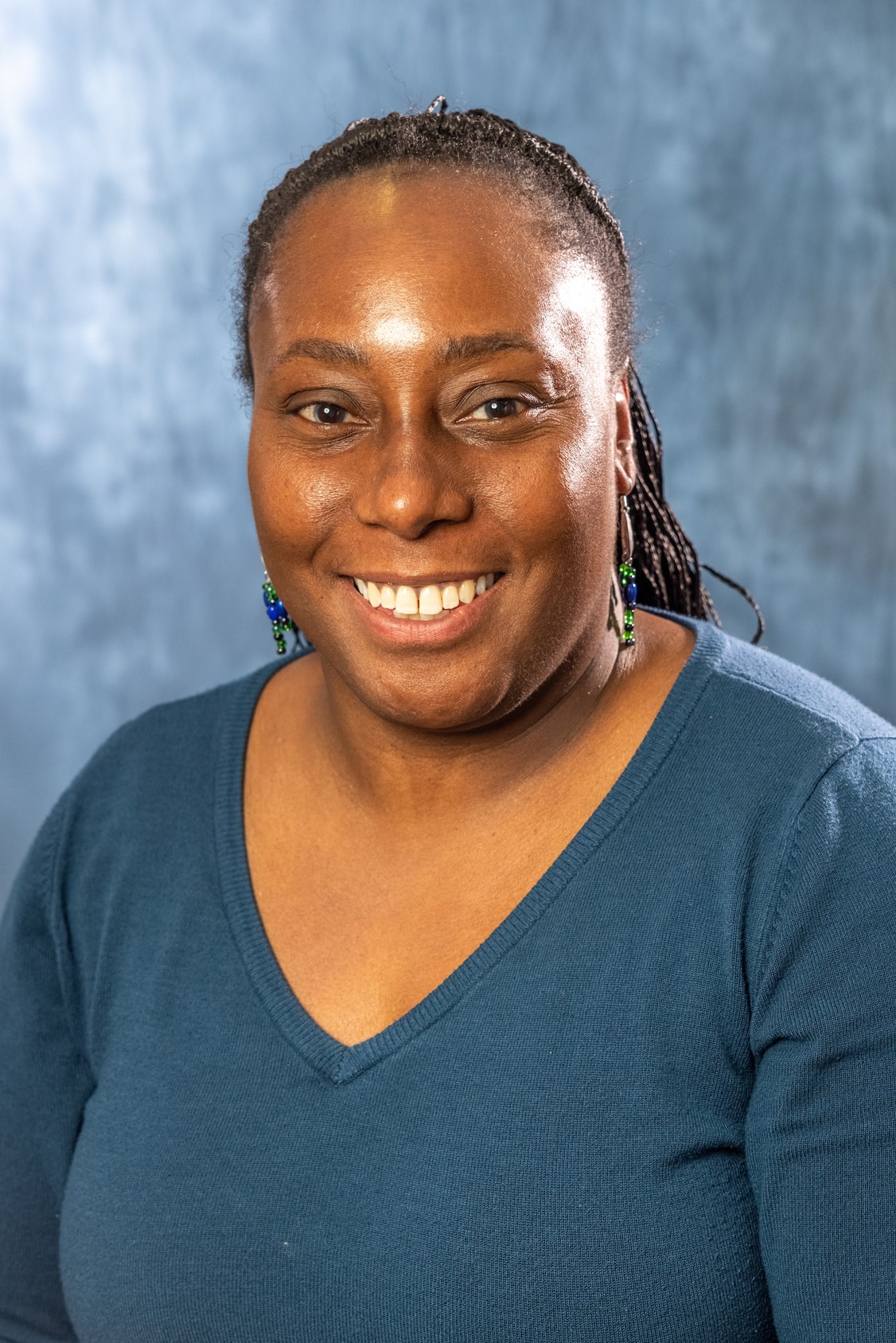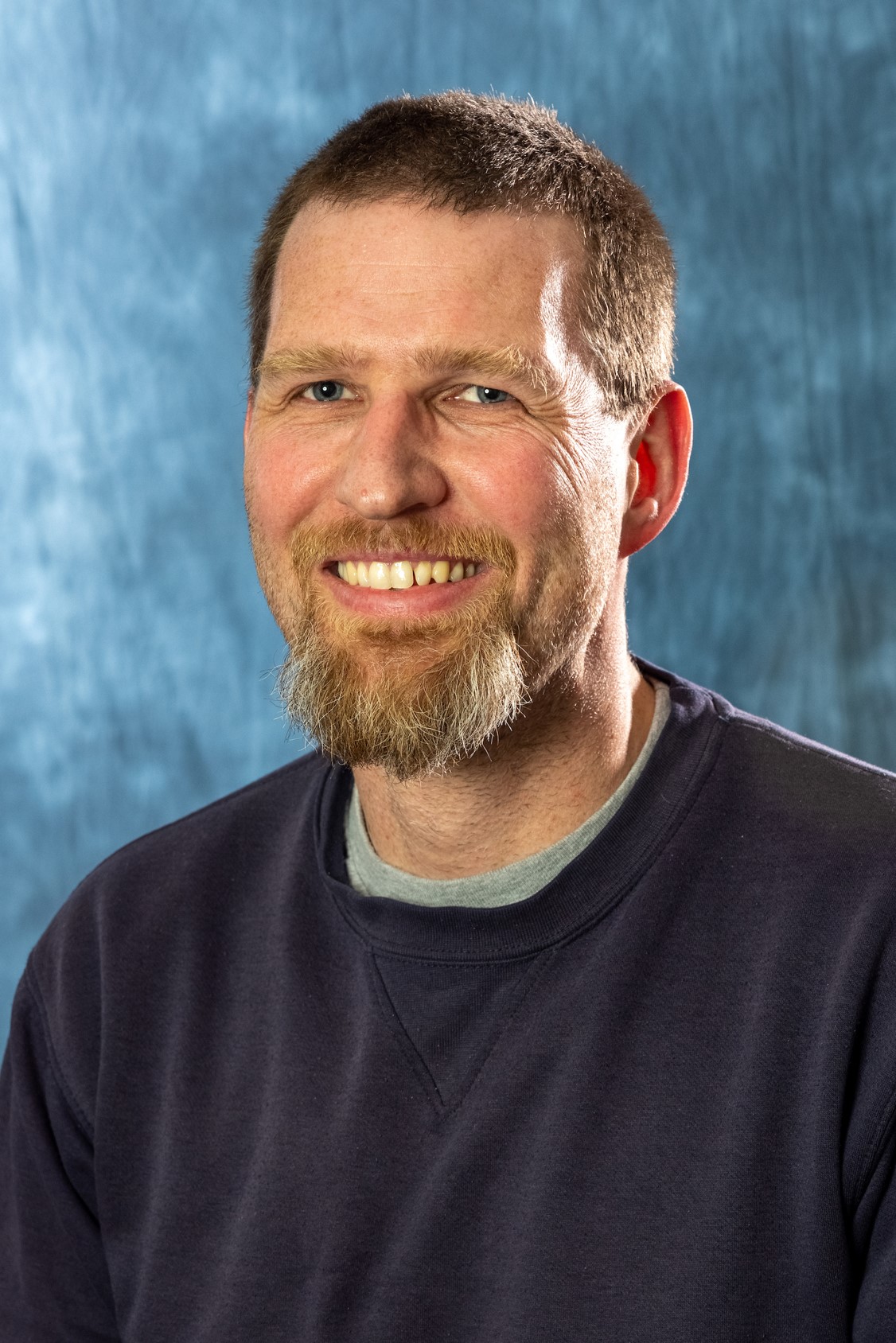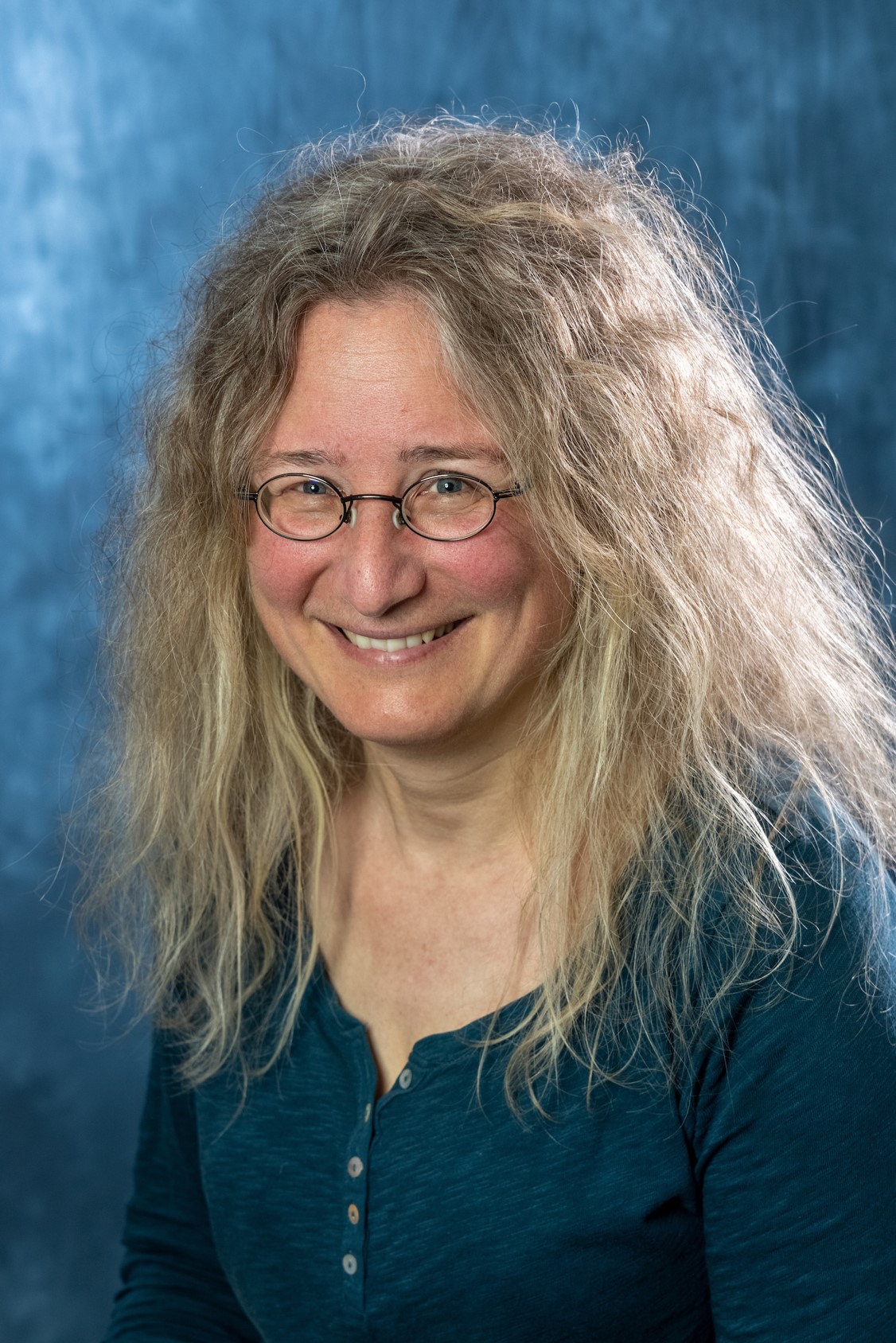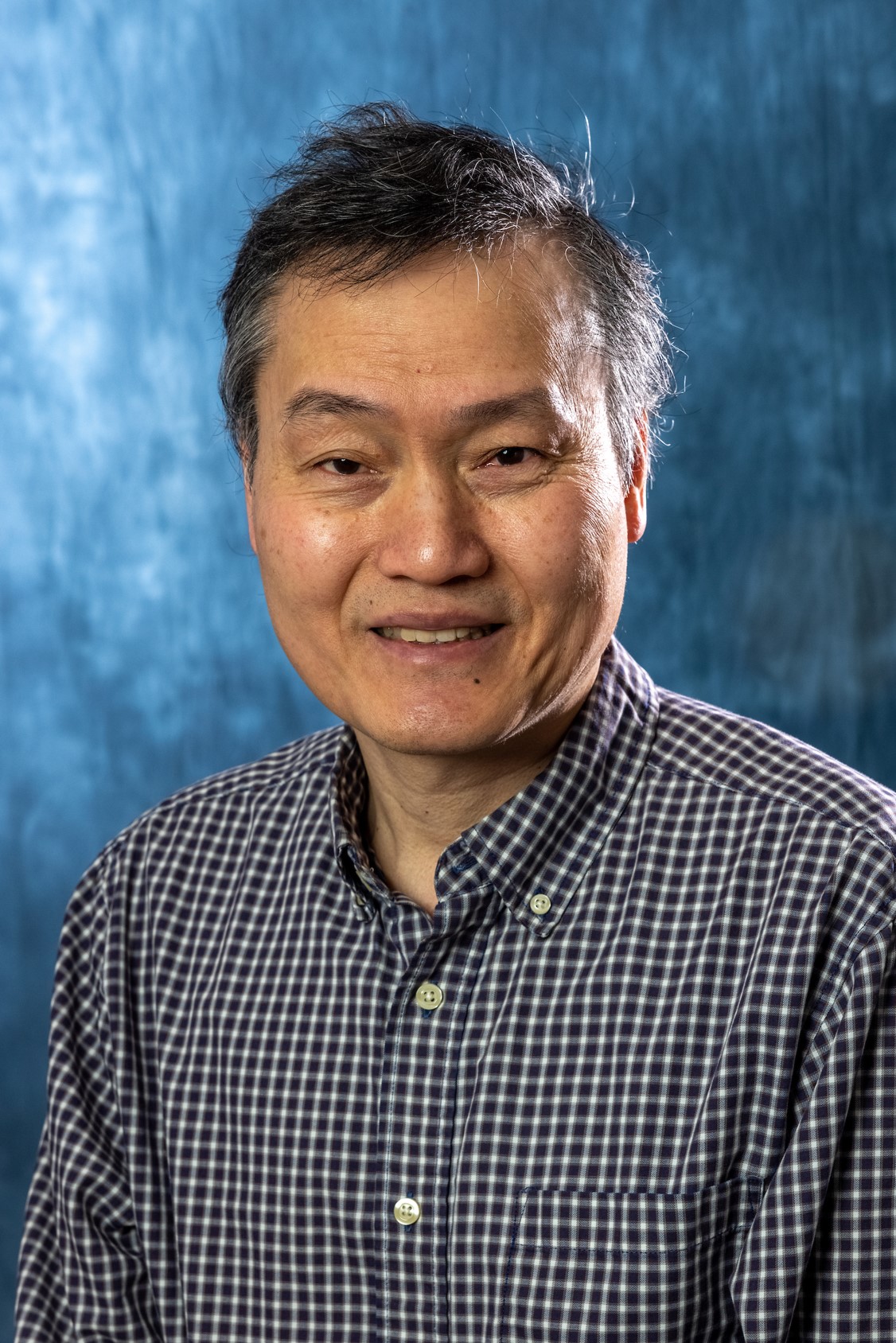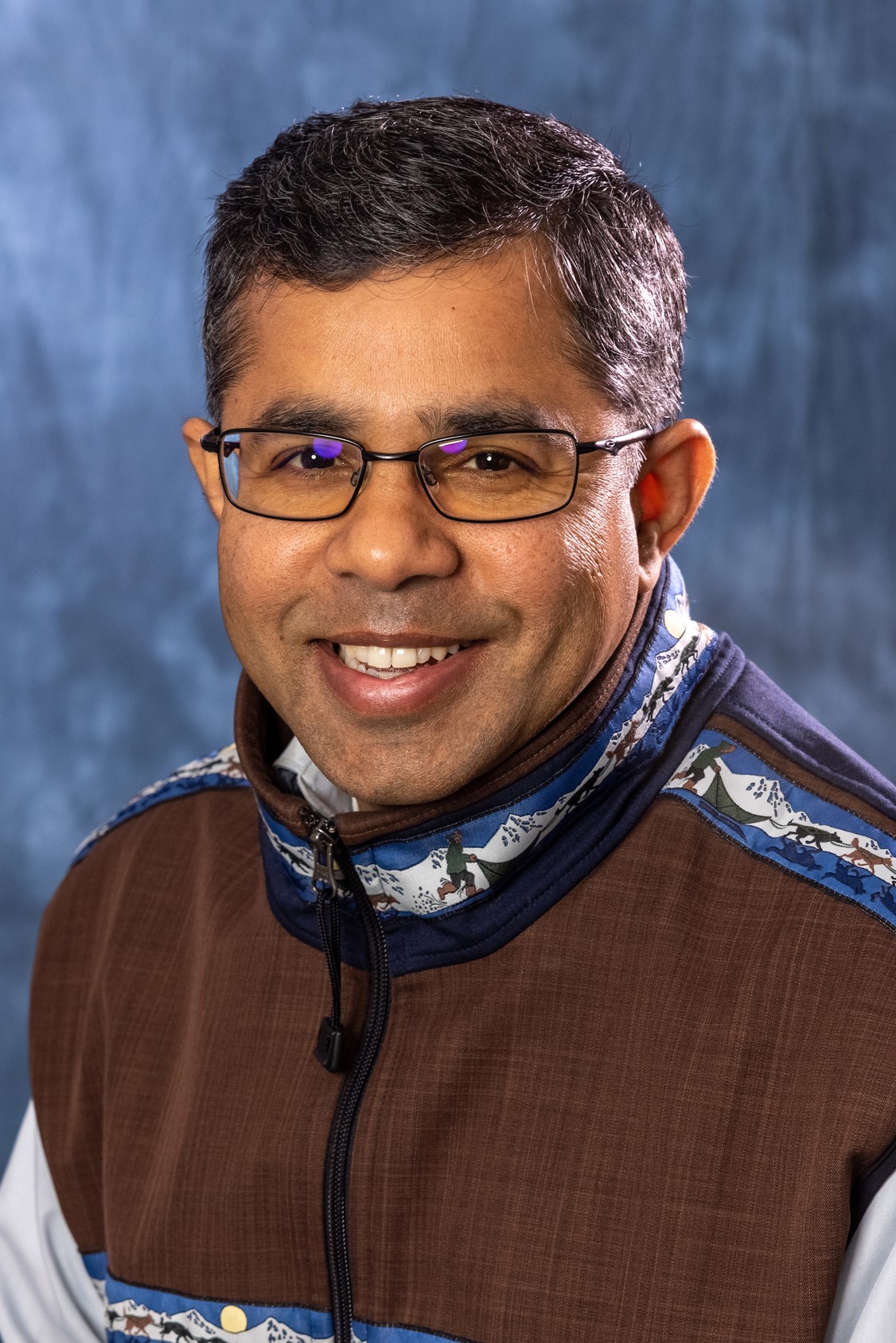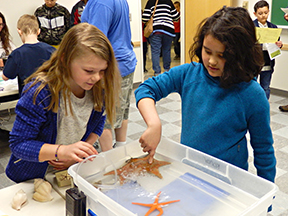Your Gifts in Action
Stories in this issue
BS in Climate and Environmental Change | Gordon Williams named editor-elect of Mathematics Magazine | Salmon habitat revegetation | Unearthing the Bering Land Bridge | Earth System Science Graduate Degree | Student Spotlight: Xochitl Muñoz | Study aims to understand cognitive decline in older dogs | Our faculty make us strong | GeoFORCE Alaska graduates third cohort | Save the date! UAF Giving Day 2024 - March 26-28 | Save the date! The Annual Science Potpourri is returning April 13, 2024
Welcome (officially), Dean Hueffer!
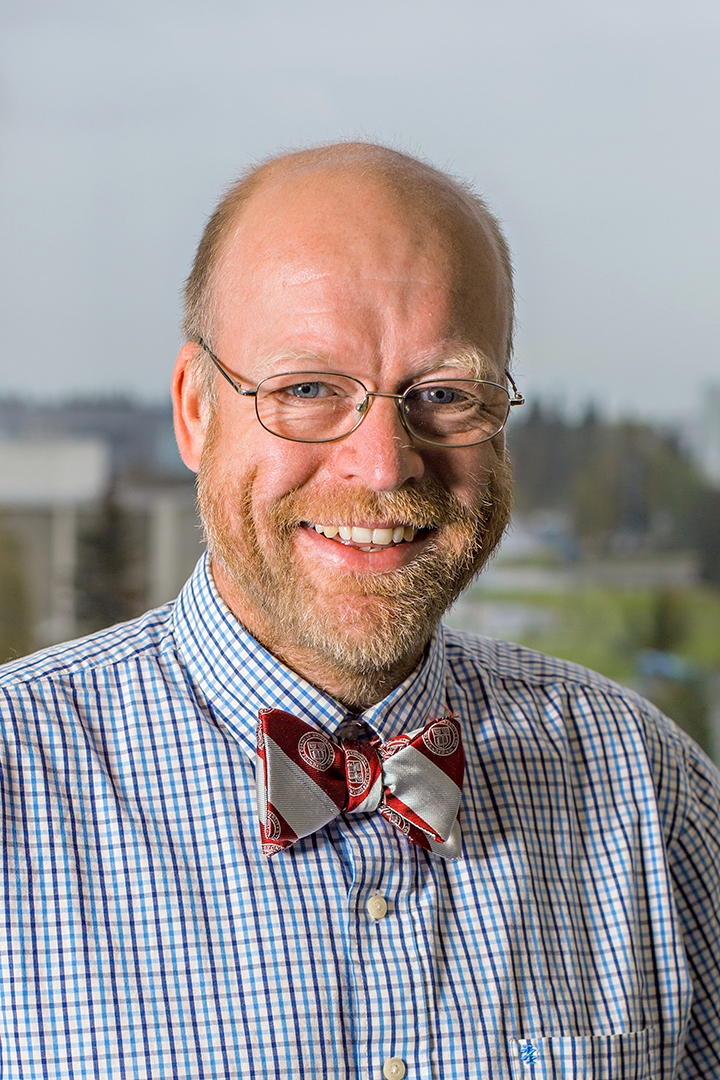
Dear CNSM donors,
The North is changing. Workforce shortages at many levels are affecting our ability to address challenges and take advantage of opportunities associated with these changes. From climate and environmental changes that challenge well established infrastructure and ways of life to the opportunity of critical mineral extraction for economic development, CNSM is addressing these workforce needs.
Our faculty and staff across eight departments prepare students in Alaska to tackle future challenges and develop opportunities for the state, our nation and the planet. Our students partner with world-class faculty on genuine research projects in classrooms, laboratories and field settings. They gain knowledge and experience while contributing innovative real-world solutions.
Your support makes this work possible. From small monthly donations to major gifts that establish endowments that support our great programs, every gift makes a difference – a difference that goes beyond a dollar figure. Knowing that you are supporting us and our students gives us extra motivation in all that we do. If you plan to give to a particular scholarship or are considering joining me in including CNSM or one of our programs in your estate planning – Thank You!
Please reach out to me, our staff in CNSM or the development office if you have any questions about how best to support CNSM and our programs that train students and develop exciting opportunities through teaching research and service.
BS in Climate and Environmental Change
New Bachelor of Science degree will position UAF graduates for success
The BS in Climate and Environmental Change, now offered through CNSM, is an interdisciplinary program of study that combines coursework in natural science, environmental management, society, and culture with opportunities to acquire additional employable tools such as computer programming, remote sensing, and GIS.
Students choose among four concentrations that emphasize different aspects of climate change: environmental earth science, physical processes, ecological processes, and sustainability. The concentrations prepare students for different types of environmentally related work in agencies and industry and for graduate study in a variety of disciplines.
This program will train students as both scientists and communicators. They will leave the program with a web-based ePortfolio that will showcase their best work and inform potential employers and post-graduate mentors about the student’s capabilities and potential.
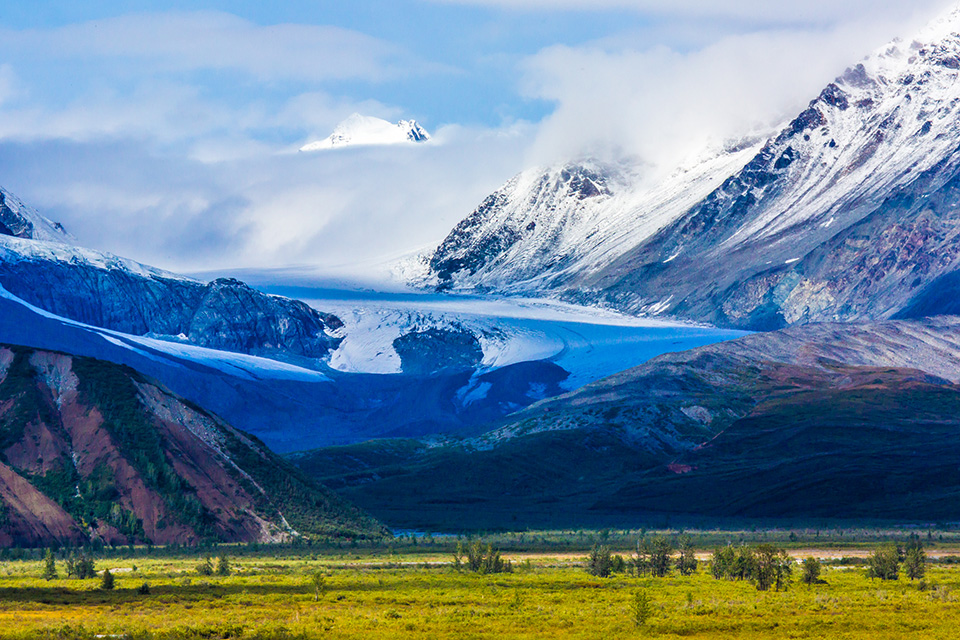
The Gulkana Glacier winds its way down from high in the eastern Alaska Range.
Gordon Williams named editor-elect of Mathematics Magazine
Editor-elect in 2024, editor-in-chief in 2025
Mathematics Professor Gordon Williams has been selected as the editor-elect for the prestigious Mathematics Magazine, one of the flagship publications of the Mathematical Association of America. His term as editor-elect will begin in January 2024.
Williams will become editor-in-chief for the magazine in 2025 and serve a 5-year term, which will include the 100th anniversary of the magazine.
Mathematics Magazine is an international, peer-reviewed journal that publishes articles meant to appeal to a broad mathematical audience. Topics cover a wide range of mathematical concepts that include original mathematics, historical content, and connections among mathematics and other disciplines.
He is excited for the role and the benefits it will bring to the university students.
“When you are a researcher, your focus gets narrower and narrower,” Williams said. “This will reacquaint me with interesting things in mathematics and provide a new awareness of what can be done to support UAF students, from techniques that can be brought back into the classroom to topics for future graduate projects.”
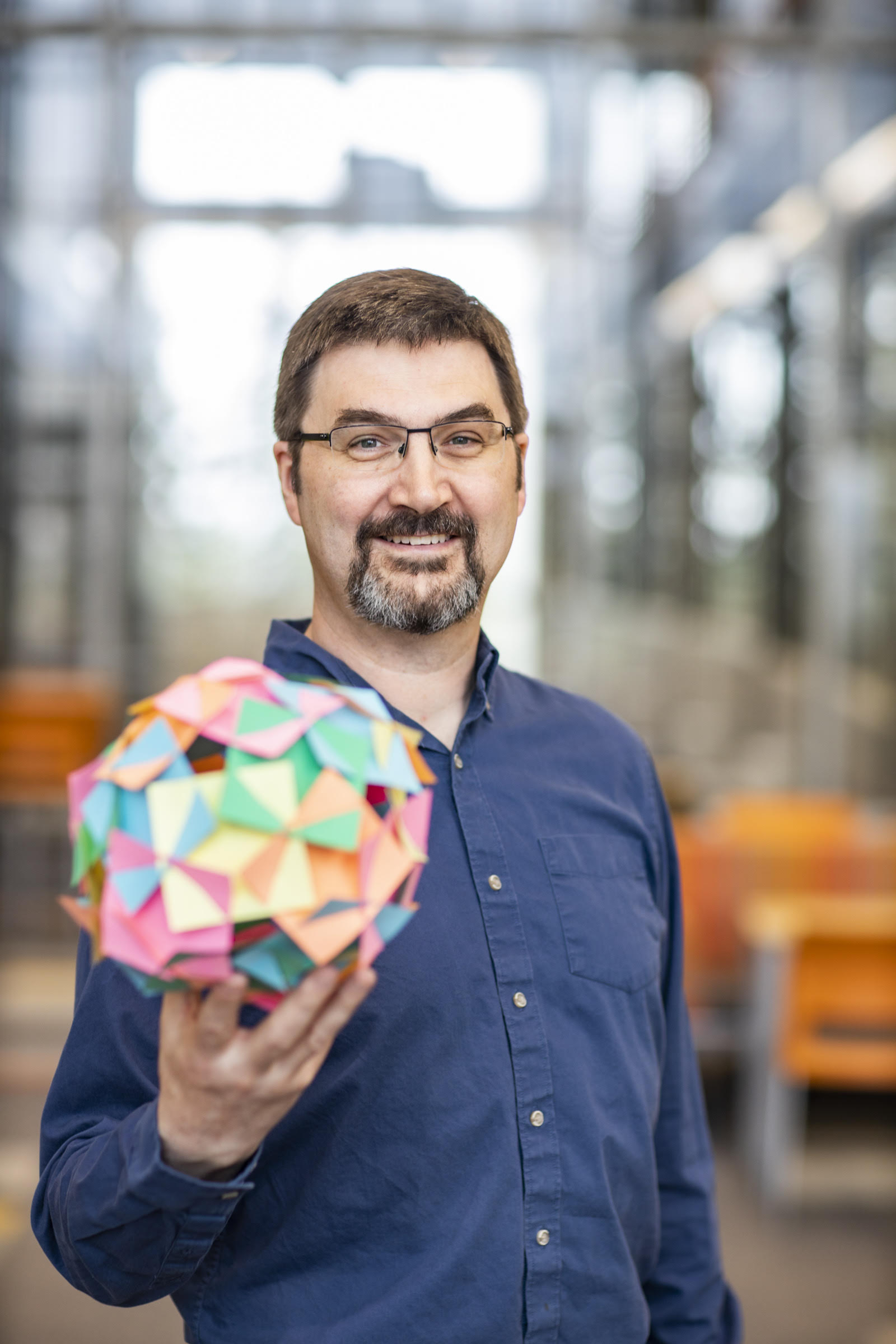
Gordon Williams
Salmon habitat revegetation
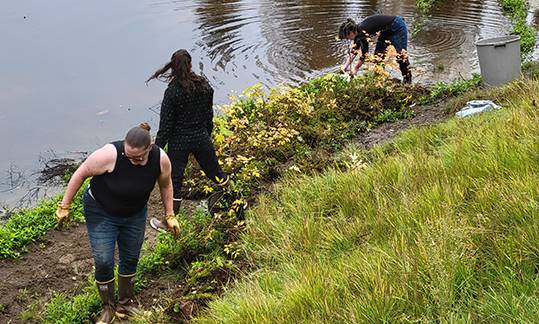
Students transplant rose hips above a buffer of willows.
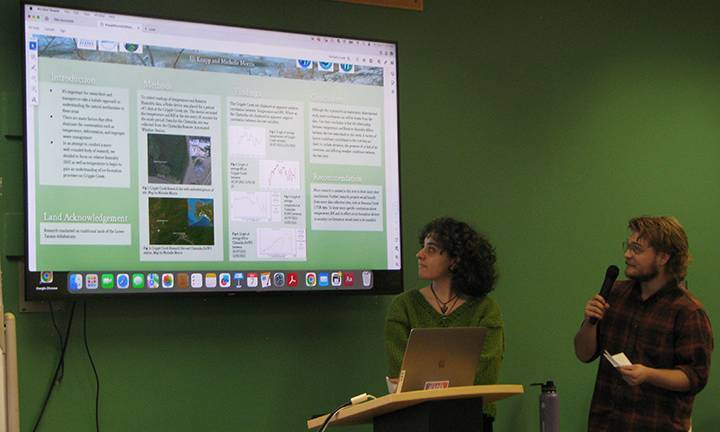
Eli Knapp and Michelle Morris present a flash talk about their self-designed research project.
Students planted 130 birch trees and relocated rose hips to aid juvenile salmon
In September 2023, students taking “Introduction to Watershed Management” (NRM 370) offered by the Department of Natural Resources and Environment, taught by Christi Buffington, joined forestry professionals in the Fairbanks community planting birch trees and transplanting roses in the area surrounding Happy Creek. Students also collected before and after soil and surface temperature data for a research project with the International Arctic Research Center.
They hope the plants will stabilize the banks and provide much needed shade for juvenile salmon making their way into the Cripple Creek watershed.
In addition to this work, as a requirement for NRM 370, the students conducted self-designed research, and contributed their data to Global Learning and Observations to Benefit the Environment (GLOBE), a world-wide open science and education program.
Unearthing the Bering Land Bridge
Collecting layers of mud and sediment to reconstruct life on the land bridge
For the first time undergraduate geology students have had the opportunity to participate in a research cruise aboard R/V Sikuliaq, which is owned by the National Science Foundation. The student team consists of graduate students Josh Barna, Sara Datson and Ryan Oeste, and undergraduates Sarah Andreanoff, Jim Costigan, Will Kleiner and Xochitl Muñoz. They joined UAF faculty Sarah Fowell, Nancy Bigelow, Mat Wooller, and Chris Maio.
The NSF-funded project collected marine sediments and microfossils that were deposited in lakes, ponds or bogs that were once above sea level on the Bering Land Bridge during the last ice age. They employed a gravity corer, a weighted tube that falls through the water and uses gravity to push it into the sediment and a vibracorer, which uses a high-frequency vibration to drive the sampling device into the sediment down to depths about 10 meters below the sea floor.
By examining these cores, they hope to reconstruct the vegetation and climate of the Bering Land Bridge.
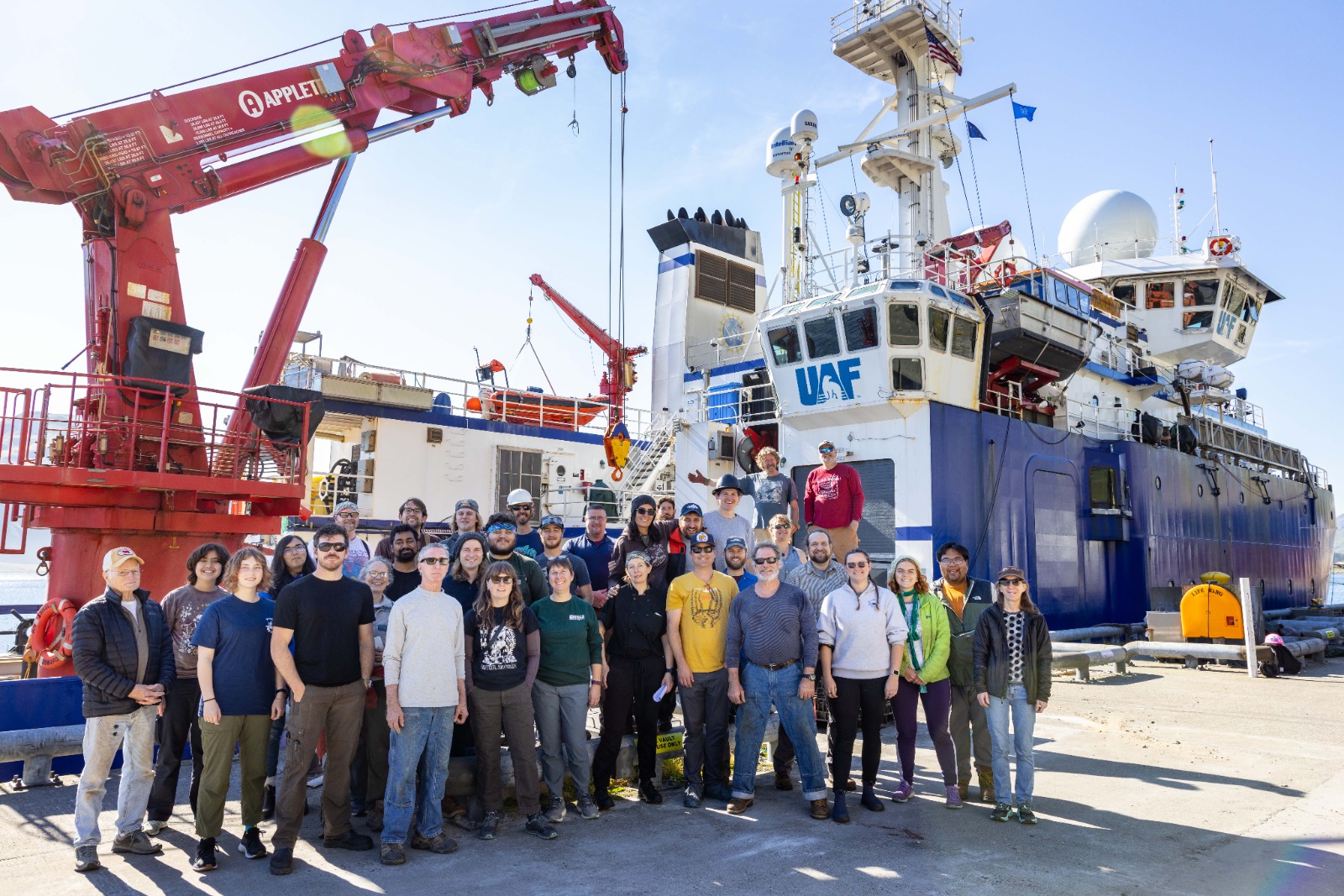
Research and support crew aboard R/V Sikuliaq for the August 2023 Bering Land Bridge Research Cruise.
Earth System Science Graduate Degree
A cross-disciplinary approach to problem solving
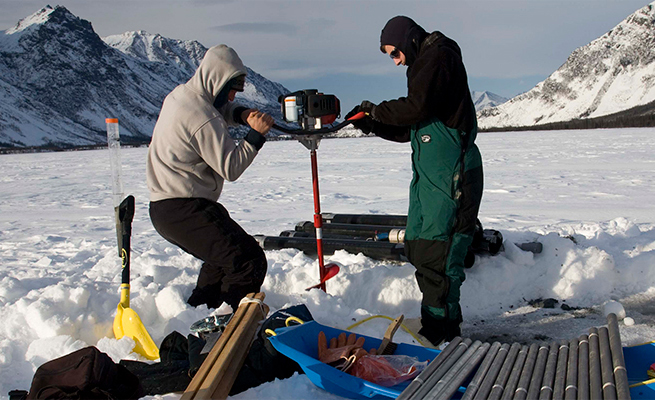
Cryosphere research, one concentration in the ESS degree program.
Several CNSM graduate disciplines have combined to create a new, cross-disciplinary graduate degree program, earth system science (ESS). In this program, students will develop the tools needed to navigate cross-disciplinary problem solving using a systems approach. This cross-disciplinary approach will aid students in creating a strong disciplinary background while providing the skills necessary to solve problems at the intersection of natural and human systems.
Students will have access to faculty that span six academic departments and programs as well as five UAF-based research institutes, including the Center for Cross-Cultural Studies. Sustainability, ethical research practices and science communications courses are built into the degree, producing well rounded earth system scientists ready to tackle modern issues.
The program includes disciplinary concentrations in sustainability, ecosystems, hydrology, atmospheric and climate sciences, cryosphere, solid earth geophysics, geoscience, and geospatial science.
Student Spotlight: Xochitl Muñoz
Bob and David Luchini Memorial Scholarship
Xochitl Muñoz, like most little kids, was fascinated by dinosaurs. As they grew, that fascination morphed into a passion for the study of paleontology. “I’ve always wanted to do paleontology – to study life on a larger scale,” Muñoz said.
Muñoz is a junior in the geosciences department and is minoring in biology. They chose UAF because, “I wanted to live in Alaska for years and when I looked into colleges in Alaska, I was really excited to find that UAF had a paleontology program, a museum and a strong research component.”
Muñoz was awarded the Bob and David Luchini Memorial Scholarship in 2023. This award has helped relieve some of the pressure of paying for college for Muñoz and allowed them more flexibility to pursue their research interests. And pursue they have.
Muñoz was awarded an Undergraduate Research & Scholarly Activity (URSA) summer research award in 2023 to focus on vertebrate paleontology. This research led to an URSA travel award to present the poster titled “Hidden mammalian diversity revealed by edentulous jaws from the Upper Cretaceous (late Campanian) Prince Creek Formation of northern Alaska” at the Annual Society of Vertebrate Paleontology meeting in October.
In August 2023, Muñoz was among four undergraduate student interns selected to participate in the month-long Bering Land Bridge research cruise aboard R/V Sikuliaq. “The whole project sounded really cool and this was an amazing opportunity to experience another style of research.”
Muñoz is currently a student intern working with Dr. Patrick Druckenmiller, at the UA Museum of the North in the Earth Sciences Lab. “When I came up to visit [as a prospective student], Pat Druckenmiller was kind enough to meet with my parents and me and give me a tour, and I wanted to work with him at the museum.”
Their labmate, graduate student Lauren Wilson, was awarded an URSA mentor award to mentor Muñoz to continue their research. This time using micro-CT scans to examine the internal structure of their edentulous jaw fossils, as part of a collaboration with University of Colorado Boulder.
Outside of academics, Muñoz is a licensed falconer in their home-state of California. Following the completion of their Bachelor of Science, Muñoz is strongly considering continuing studying Mesozoic mammals (those that lived between 252 to 66 million years ago) for a master’s degree.
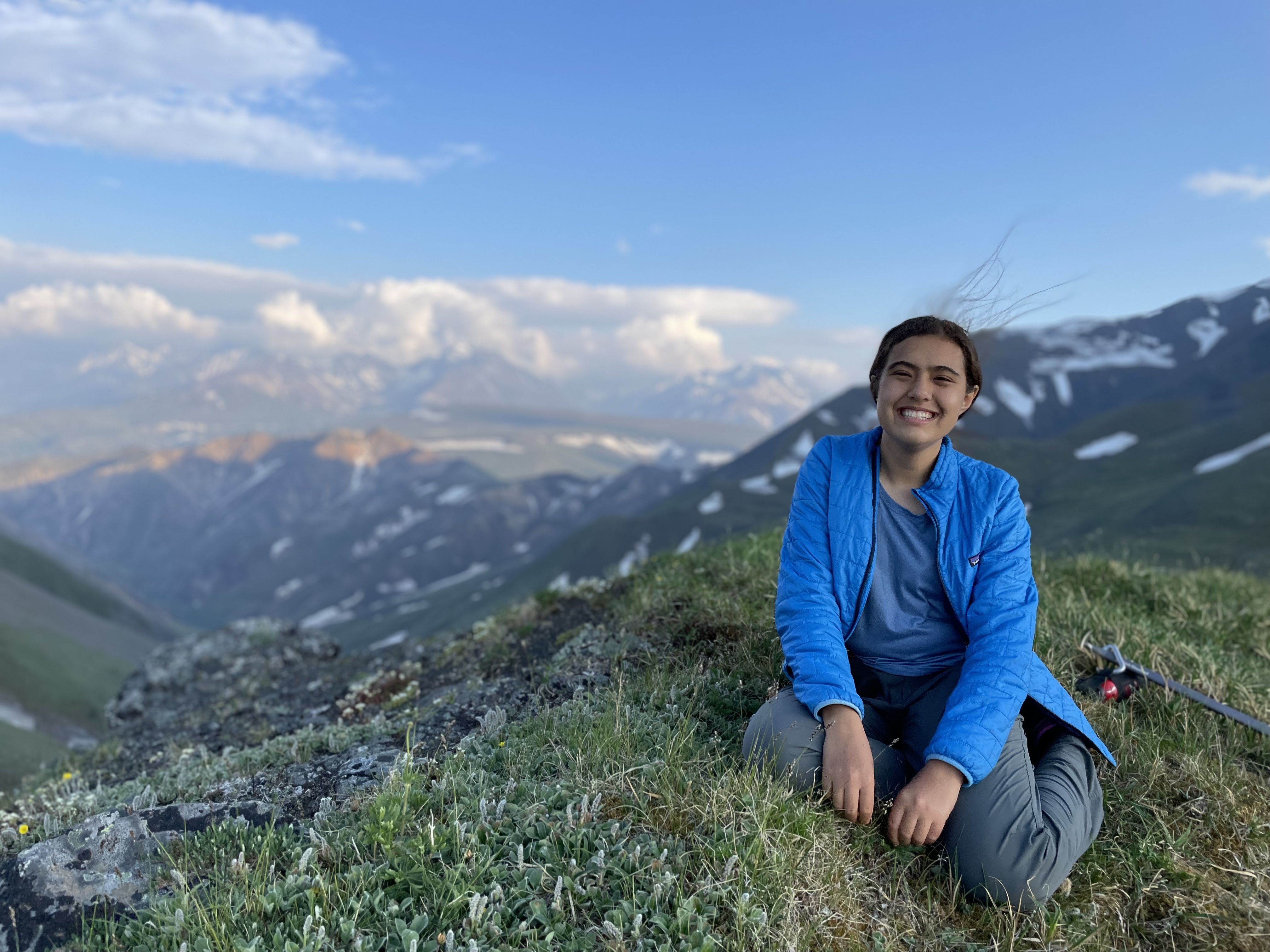
Xochitl Muñoz in Denali National Park
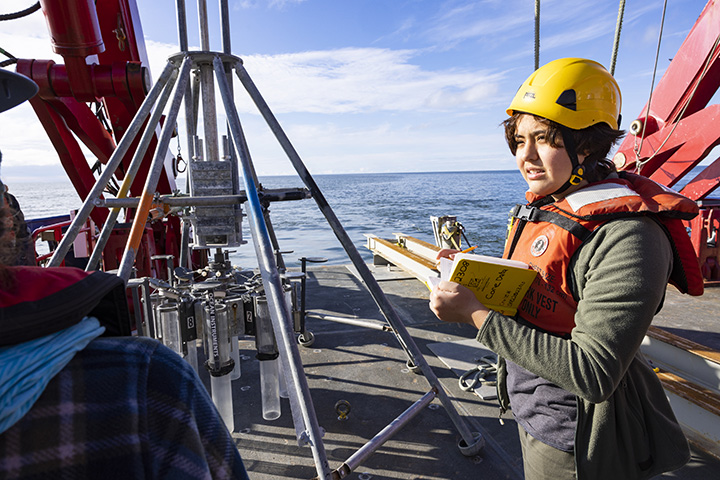
Xochitl Muñoz aboard R/V Sikuliaq.
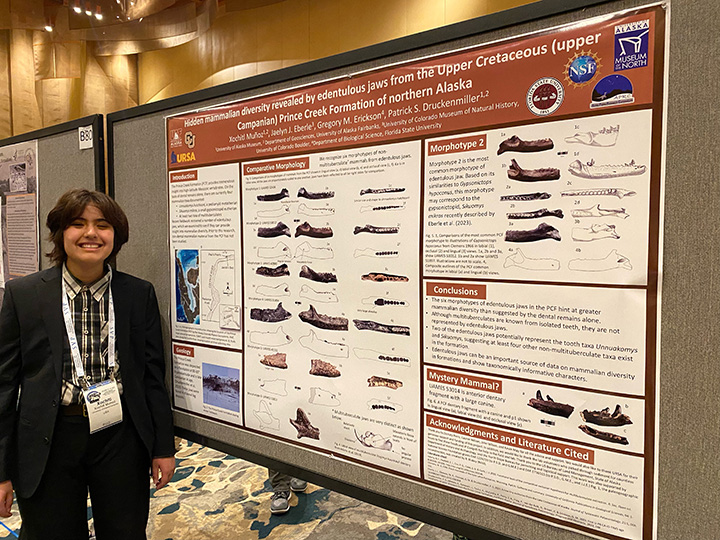
Xochitl Muñoz Presenting at SVP 2023.
Study aims to understand cognitive decline in older dogs
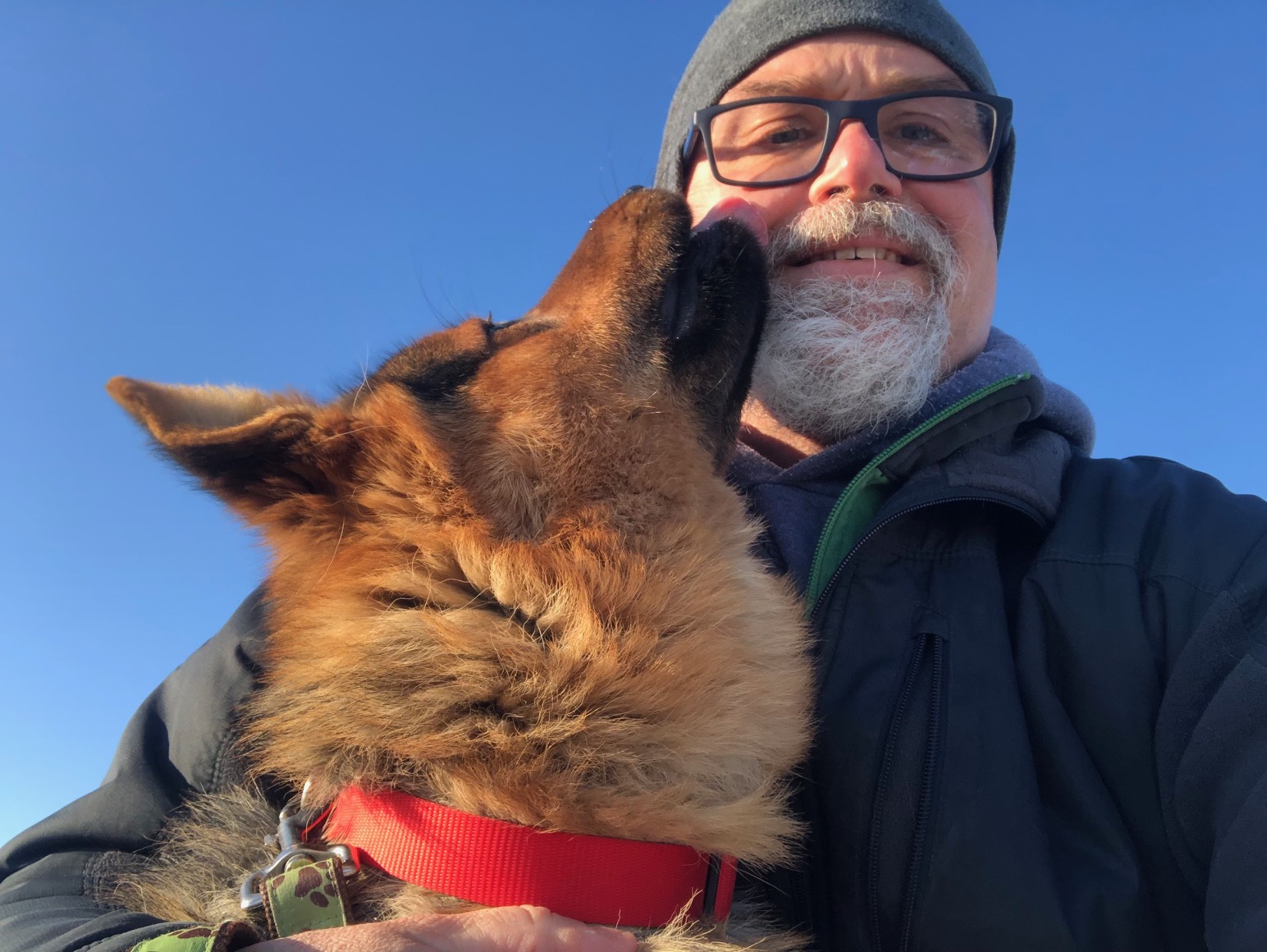
Gregory Pietsch and his companion Utqi.

Gregory Pietsch with his companion
Interior Alaska is a place where canines are loved as companion animals as well as for sport and transportation.
Gregory Pietsch, a veterinarian and assistant professor in the CNSM Department of Veterinary Medicine, has launched a study of cognitive decline in older Alaska dogs. Neuronascent Inc. has awarded Pietsch a $10,000 grant to research the disorder’s progression in the canine community. Neuronascent is a biopharmaceutical company that develops novel therapies for neurodegenerative disorders like Alzheimer’s and Parkinson’s disease. Canine cognitive disorder, or CCD, presents similarly to Alzheimer’s disease in humans, with symptoms including disorientation, failure to recognize family members, inability to retain control over basic bodily functions, and changes in personality.
“I’ve too often seen the impact of cognitive decline on the lives of dogs as they age and the subsequent impact on the humans who love them,” Pietsch said. “Currently our ability to diagnose and offer treatment for these patients is limited. Learning to better identify CCD is an important first step towards the testing of effective treatment options.”
The cognitive disorder may affect a larger percentage of older dogs than previously thought, affecting their quality of life and lifespan. Early signs of decline often go unrecognized by the owner or veterinarian. The project’s goal is to determine the current status of dogs from the Interior. This study will aid in evaluating how the disease progresses with time and the effectiveness of future treatments.
Researchers will work with local veterinarians to recruit dogs older than eight and look for symptoms of decline. In addition to state-of-the art technology such as MRI to scan the dogs’ brains and evaluate images, they will use tools similar to those used to assess Alzheimer’s disease in humans, notably cognitive scoring, blood markers, brain volume measurements and estimates of the loss of sense of smell.
Our faculty make us strong
Celebrating promotion and/or tenure
GeoFORCE Alaska graduates third cohort
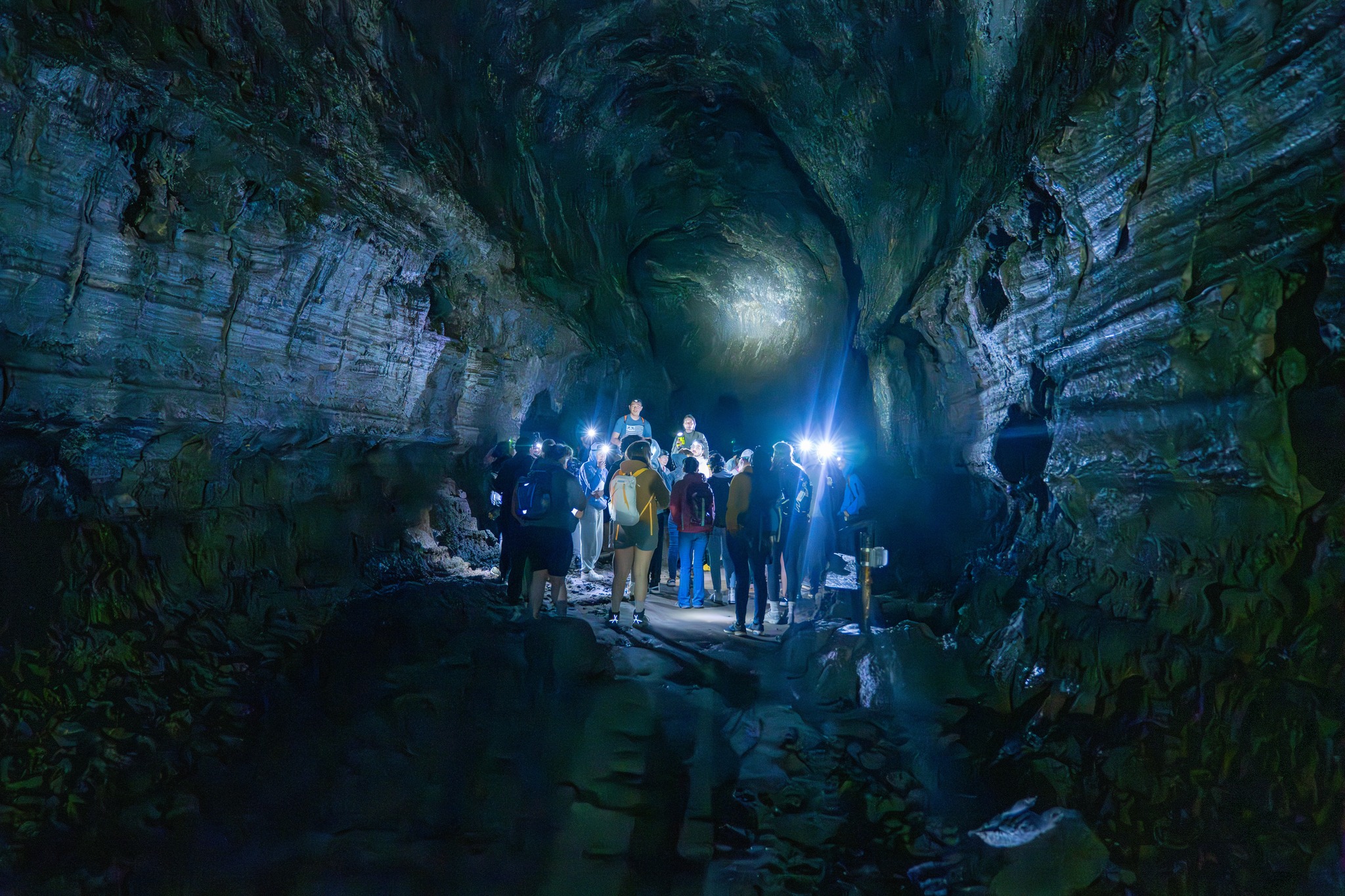
Cover image: GeoFORCE Alaska students exploring Lava River Cave, part of the Newberry National Volcanic Monument in Oregon. The students explored the 2.2 mile roundtrip cave walk with guides explaining the surrounding geology.
COVID-19 may have cut a year from the program, but that didn’t hold these students back
Twenty-six rural Alaska high school students graduated from the GeoFORCE Alaska program on Wednesday, June 21, 2023, at the Loussac Library’s Wilda Marston Theatre in Anchorage.
The students came from 17 communities off the road system in the Northwest Arctic, North Slope and Interior regions of the state. Participants have studied glaciers, volcanoes, waterfalls and more in seven states over the past three years, visiting landmarks like Denali National Park, the Grand Canyon, Dinosaur National Monument, Mount St. Helens and Yellowstone National Park.
GeoFORCE Alaska students are recruited after eighth or ninth grade and typically spend two weeks studying geology each summer for four years. The COVID-19 pandemic stalled this cohort’s first summer, so the program was condensed into three summers. These students are the program’s third cohort.
The sponsor-supported GeoFORCE program aims to raise high school graduation rates in rural Alaska; encourage students to pursue science, technology, engineering and math majors in college; and increase the number and diversity of Alaska residents entering Alaska’s technical workforce.
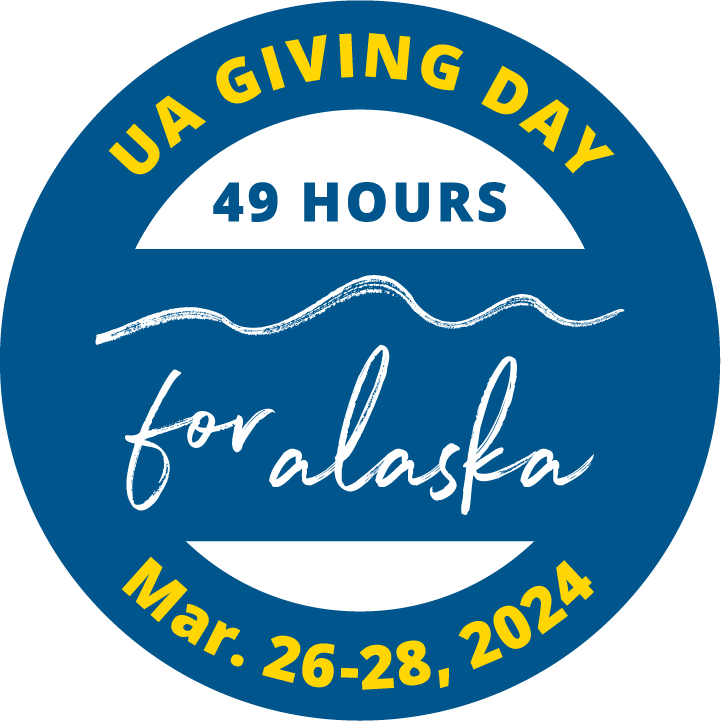 Save the date! UAF Giving Day 2024 - March 26-28
Save the date! UAF Giving Day 2024 - March 26-28
49 Hours for Alaska
Show your support for the College of Natural Science & Mathematics this UAF Giving Day by supporting programs or departments you care about. Gifts of any size make a tremendous difference to our students. Visit UA Giving Day: 49 Hours for Alaska | UAF College of Natural Science and Mathematics to participate in Giving Day 2024.
Save the date! The Annual Science Potpourri is returning April 13, 2024
After a COVID-related hiatus this popular public event returns
Designed to spark children’s curiosity about the sciences, the free, all-ages, family-friendly expo will return to the Reichardt Building on the University of Alaska Fairbanks Troth Yeddha’ Campus on April 13.



